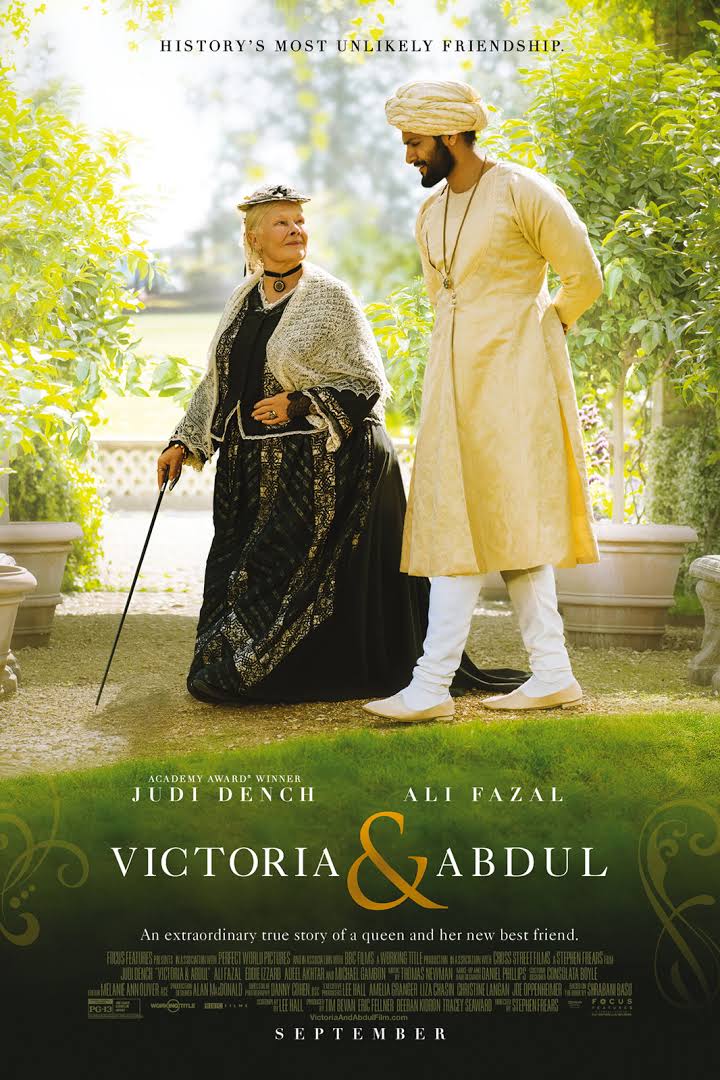Victoria & Abdul is a film about a surprising relationship. Abdul Karim arrives from India to participate in Queen Victoria’s golden jubilee. The young clerk is surprised to find favor with the queen herself.
The setting for Victoria & Abdul is Agra, which is most famous for the Taj Mahal. The opening words are in Urdu – which I still speak.

Credit: Wikipedia
The monument continues to impress globally, sadly the city remains squalid. The film’s actions are all encompassing and the viewer is immediately intrigued, amused and astounded. Fifteen years is truncated into a film but the events portrayed more or less took place.
In the story of Victoria & Abdul, Abdul Karim was sent to the Court of the ageing Queen Victoria in 1887 along with a fellow Muslim. Judi Dench is outstanding as the ageing monarch but I felt it was wrong for her to be played as an 80-year-old plus from the start whereas she was younger than I am now as I write this. The actress is 82 but the queen was 68 in 1887 yet depicted as old and frail with table manners of a glutton. She probably did like her food but was that necessary?
Abdul Karim soon entranced her and one can see why; surrounded by toadying sycophants, lonely, with rather foolish spoilt children, still grieving for John Brown and her beloved Albert. Had Prince Albert not died in the prime of his life there would have been no John Brown and no Abdul the Munshi. But here was a lonely old woman beset with cares of ‘empire’ and mindful of her duty but still with a questing mind who absorbed readily the knowledge he easily imparted.
She became yet again a dutiful student but this time of Urdu. Abdul was an opportunist there is no doubt and he was able to improve his position but who could blame him. The Victorian court was one of supercilious racist disdain for anyone who was ‘not one of them’. There are many of them about to this day.
We watched Victoria & Abdul in Edinburgh and the audience was chuckling as were we in many of the scenes as some of the action takes place in Scotland. There were some good touches in that the queen’s physician, who constantly wants to know are her bowels regular, is a sniffy Edinburgh trained doctor who is appalled at some of his royal patient’s requests.
I felt that the English subtitles of the fellow servant of the Munshi was unnecessarily crude and I doubt people in the 1890’s spoke like that at all, but it raised a laugh in the audience. There was pathos, and spectacle, comedy and some sadness.
Just for the record, Bertie the queen’s heir played by Eddie Izzard appears as a thoroughly unattractive character…well maybe he was, but I do know in his short reign he cemented the Entente with France and loathed his flawed nephew the Kaiser – understandably.
Queen Victoria is called the Grandmother of Europe, yes at a time when monarchies were washed away by a great savage war, and revolutions. As for the Munshi – Abdul Karim. It is known that King George V when he was Prince of Wales visited him in his home in Agra on his first visit accompanied by his wife then Princess of Wales later Queen Mary.
From November 1905 to March 1906, George and Mary toured India where George was disgusted by racial discrimination and campaigned for greater involvement of Indians in the government of the country. He had also upon return from his trip to Australia and other lands in 1901 spoken of the aspirations of those people at a Guildhall luncheon to welcome him home; the prime minister of the day politely told him to stop interfering.
To this day, when I return to princely palaces in India I see great huge photographs of the royal couple’s visits in Rajasthan and elsewhere. King George and Queen Mary then returned to India in 1911 for the great Durbar of which much has been written.
Indian royalty has had their own pomp and grandeur and ancient lineage and Victoria & Abdul brings you back into that world. It was just so unfortunate that through all that time the air of supercilious superiority prevailed through much of British society – how much more enriching would have been the whole experience for Great Britain and India if her subjects had had more of an open generous mind as shown by the lonely old queen? I recommend Victoria & Abdul as a must see.
The Director of Victoria & Abdul is Stephen Frears and the screenplay was written by Lee Hall, based on the book by Shrabani Basu. You can visit its IMDb page for more information on the film.
Aline Dobbie is an author of four books on India and a travel writer. She lives in Scotland but travels widely throughout the year with an annual visit to India where she was born & grew up. Aline’s earlier life was in the corporate world but now lives a rural life with emphasis on travel, gardening, cooking, and family. India, South Africa, England, Scotland, Greece and other lovely places are a constant delight to her.








